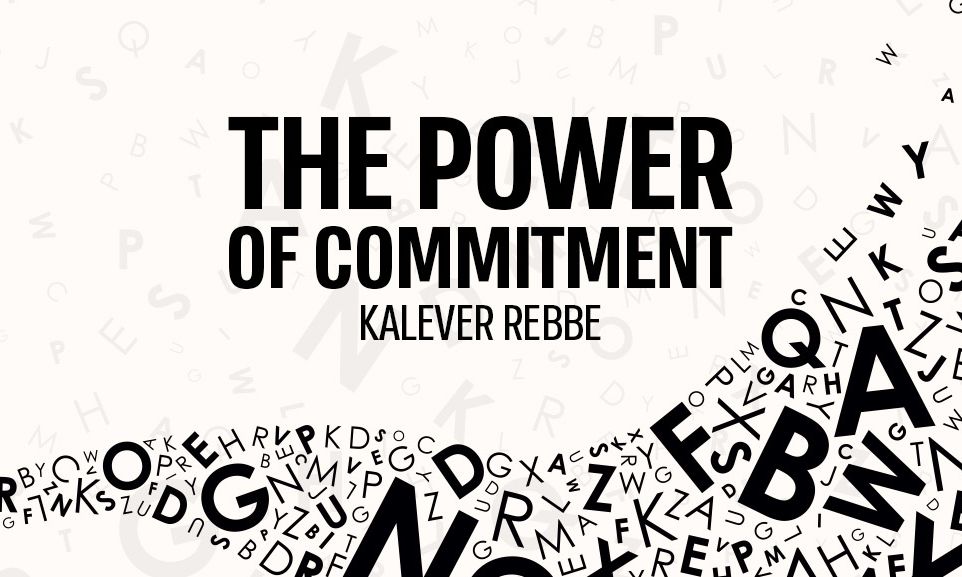
The Power of Commitment
How often do we find ourselves with little self-confidence to make desired changes in our lives? How can we give ourselves a needed boost of strength to overcome our challenges? The Kalever Rebbe gives a surprisingly simple solution...

Words of Inspiration
Nowadays, we have merited to see yidden change their entire lifestyle, after hearing inspiring words at conferences, or even through one-on-one conversations. In a single moment they transform themselves.
We have even seen yidden who have become completely addicted to things that are alluring, like smartphones and unfiltered internet, abandon those behaviors.
While some behavioral specialists and psychologists believe that it is impossible for a person to change their entire being and to end an addiction in a single moment, we have seen that the reality in our communities is quite the opposite. When yidden hear words of chizuk (strengthening) and inspiration and they accept upon themselves to change their behavior, they find the ability to fulfill that commitment successfully.
I have personally witnessed this with the men, women, and children who have met with me seeking brachot (blessings), guidance, and chizuk. During our meeting, I would ask them to promise to accept upon themselves certain behaviors to protect their kedusha (holiness), or a specific mitzvah. They would protest and say that they simply cannot change that quickly. Eventually, they would agree.
Over time, I would witness that they were completely transformed as people through the commitment to that promise. They would overcome their challenges and proceed to live happy and successful lives and build beautiful Jewish families on a foundation of Torah and mitzvot.
The Supernatural
Truthfully, these experts are not so wrong. They are experts in studying behavior and the inner workings of the mind. However, as scientists, they are limited to understanding the world through a prism of the laws of nature. And according to nature, it is extremely difficult for individuals to overcome challenges and to completely change their behaviors.
We see this clearly. There are countless experts and psychologists in the secular world who express grave concerns about the destructive impact that the internet, social media, and smartphones are having on society as a whole and on the well-being of individuals, especially children. Even the early developers of these innovations have become advocates against their usage. Despite these warnings and concerns, nothing is truly being done. The secular world has not disconnected from these devices or changed their behaviors.
The yidden however can accept upon themselves resolutions, commitments to change their behavior, to overcome spiritual challenges and they can be successful. A yid can change everything about the person he is, and who he will be, in an instant.
This is only possible because the yidden have a unique and special se’eyata d’shemaya (Divine help). Chazal teach us in Yuma (38b) that “הבא לטהר מסייעין אותו” (One who wants to purify himself receives help from Heaven). Without this precious help from Hashem, it would be impossible for a yid to overcome his challenges. Chazal also teach us in Kiddushin (30b) that אלמלא הקב”ה עוזר להאדם אינו יכול להתגבר על יצרו (Without Hashem’s help, a person cannot overcome his Yetzer Harah).
Only with Hashem´s help can the yidden overcome any challenge regardless of how overwhelming that challenge might feel.
What is a Yid?
I once heard from a reliable source, a story from R’ Baruch of Mezibuz, zt”l, the grandson of the Baal Shem Tov:
R’ Baruch was once with his grandfather when a non-Jewish degenerate asked the Baal Shem Tov, “I don’t understand. How can you control all your desires?”
“I am already an old man,” the Baal Shem Tov answered, “and all of my passions have subsided.”
As they walked away, R’ Baruch asked his grandfather, “Why didn’t the Rebbe simply explain to him that you are a yid and a yid has the ability to overcome his animalistic desires and temptations?”
“It is very difficult to explain to a non-Jew what a yid is,” answered his grandfather.
R’ Baruch was relating this story many years later, and when he finished, he sighed and said: “Nowadays it is difficult to explain even to a yid what a yid is.”
Know Who You Are
We are living during the times of Ikvasa D’Meshicha (Footsteps of Mashiach), and the Yetzer Harah works tirelessly to convince a yid that he isn’t capable of change; that he doesn’t have the strength and ability to overcome the spiritual challenges that he faces in his life. He wants the yid to succumb to his desires, to be addicted to his temptations, and to lose all hope of returning to purity, Torah, and Mitzvot. He wants the yid to believe the “experts” when they say that drastic change is impossible, and to feel despondent consumed by despair.
The Yetzer Harah is constantly trying to instill this sense of despair even in the hearts of teachers, communal leaders, parents, rabbis, and businessmen; no one is immune. He wants them to give up and accept defeat.
A yid must and can counter this cunning by focusing on the unique qualities that define a yid. Every single yid is a prince and princess, sons and daughters of the King of Kings. Our Father in Heaven is benevolent and merciful and desires to have a relationship with us, and provides us with the help we need to be close to Him through the Torah and Mitzvot. This help is supernatural; it isn’t bound by the rules and parameters of the physical world.
Realizing the potent potential of every yid can safeguard you from falling victim to the temptations of the Yetzer Harah, and protect you from forgetting what distinguishes you from all the other nations on the earth, for which this forgetfulness is very harmful, as R’ Shlomo of Karlin, zt”l, said, “The Yetzer Harah is the strongest when a yid forgets that he is a ben Melech, a prince.”
The Power of Words
This se’eyata d’shemaya – Divine Help – is particularly more accessible when a yid verbally commits himself.
Practically speaking, whenever something is verbalized it makes a person feel more obligated to fulfil that promise. This is especially true if he tells other people about his resolution. No one wants to be embarrassed by reneging on a commitment they made publicly. Therefore, they will work harder to remain true to those commitments.
But, there is a far more powerful dynamic taking place when a yid verbally articulates a commitment. He receives a special segulah, the holiness of those words protect him from the impure powers in the world, as it says in the Zohar (Yisro 91b and Chaya Sara 129a).
It says in Tehillim (119:106), “נשבעתי ואקיימה לשמור משפטי צדקך” (I swore and I fulfilled, to keep the judgments of Your righteousness). The Sefat Emes (Parshat Mattot) explains that through the fact you “swore”, that you verbally took an oath, you will merit to “fulfill” that oath. When you make a promise to perform a mitzvah, the spiritual powers of that mitzvah of promising will protect you from Above and help guide your behaviors towards kedusha, holiness, and your fulfillment of that mitzvah.
More than a Grain
This is the lesson that this pasuk is teaching us: “ונחשב לכם תרומתכם” (It is considered for you as your contribution). You need to remember and recognize the significance of your ability and power to raise yourself from the physical desires of this world and draw close to Hashem.
This rise works as the pasuk continues, “כדגן מן הגורן” (Like grain from the threshing-floor). A simple piece of grain can become worthy of becoming a trumah offering, of becoming holy, simply by a yid saying, “Behold, this is for trumah.” In that moment, a simple piece of earthly grain became something holy and designated for Hashem. It is now a completely different entity.
So too, when a yid verbalizes a commitment to Hashem to perform a particular mitzvah, he becomes holy, and his entire entity is transformed. And, through the verbalization of that commitment, the yid receives se’eyata d’shemaya – Divine Help – to fulfill that commitment.
With Hashem’s help, every yid will find the strength to remember that they are a ben and bat Melech, that they have the ability to distance themselves from dangerous things like unfiltered internet, and to transform their struggles into opportunities to grow closer to Hashem, through verbalizing your commitments. And, by doing so, they will merit to live a happy and successful life filled with only Hashem’s kindness and blessings.
An example of a good resolution

***
The Kalever Rebbe is the seventh Rebbe of the Kaalov Chasidic dynasty, begun by his ancestor who was born to his previously childless parents after receiving a blessing from the Baal Shem Tov zy”a, and later learned under the Maggid of Mezeritch zt”l. The Rebbe has been involved in outreach for more than 30 years, and writes weekly emails on understanding current issues through the Torah. You can sign up at www.kaalov.org.








7/05/2022
Strengthening & B’Simcha Thanks